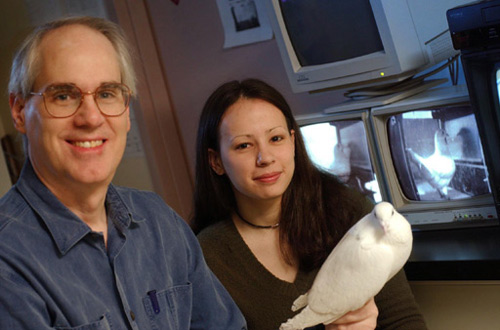Robert Allan, associate professor of psychology, recently discussed his research on choice responding of pigeons in an event sponsored by the Lafayette chapter of Sigma Xi, the international honor society for scientific and engineering research.
Allan’s talk was titled “Choice Responding to Dynamically Changing Patches: Does Behavior Track Pay-off Changes?” It was be based on laboratory research with pigeons described in an article coauthored by Allan and a colleague at Jacksonville State University, which was recently published in the Journal of the Experimental Analysis of Behavior.
A patch is a location where a laboratory pigeon would eat as part of an experiment, Allan explains. The results of experiments like this may help explain how human choices are influenced, such as someone choosing one of two equidistant grocery stores because it has an attractive sale, or is cleaner.
In one of Allan’s experiments, pigeons were given two response keys to peck (similar to an elevator button). Pecks to the keys delivered food aperiodically. On one key the rate of food delivery increased over a five-minute period, on the other key the rate of food delivery decreased over the same five-minute period. He found that their choice behavior tracked the dynamically changing pay-off schedules.
“The results suggest that behavior is very carefully guided by the environment,” says Allan. “I’m sure that we’d get similar results from humans performing a similar task.”
Allan is author of Statistical Reasoning in Psychology and Education and has shared his research through journal articles, book chapters, and more than 50 conference presentations. He also has given many symposium and colloquium talks.
He has frequently involved psychology majors in his research, including Kelley Borradaile’03 (Churchville, Pa.) on the role of clocks in the control of behavior, which she explored by observing pigeons and how they react when their lives are organized by specific times established in the laboratory.
Allan, Borradaile, Heather Stauffer ’03 (Easton, Pa.),and Kristopher Klein ’03 (Oswego, N.Y.) coauthored and presented three papers in May at the annual meeting of the Association for Behavior Analysis in San Francisco, Calif.
Allan was the editor of the journal Behaviorology, The Division 25 Recorder (a publication of the American Psychological Association), and PsycSCAN: Behavior Analysis & Therapy. He also has served as guest reviewer for a number of other academic journals, publishers, and organizations such as the National Science Foundation.
In addition to college funding, Allan has received grants from the National Institute of Mental Health, the National Science Foundation, and the New Jersey Department of Higher Education.
A two-time recipient of Lafayette’s Superior Teaching Award, Allan received a Ph.D. in experimental psychology from New York University and a bachelor’s of science from Brigham Young University. He joined the Lafayette faculty in 1991.

Using pigeons as test subjects, Kelley Borradaile ’03 and Robert Allan, associate professor of psychology, investigated the effects of clocks on behavior in an EXCEL Scholars project.
